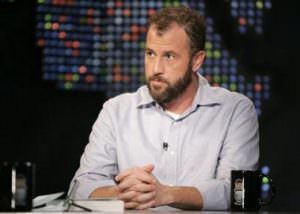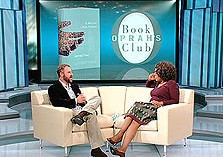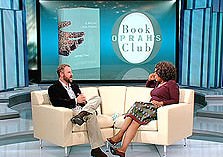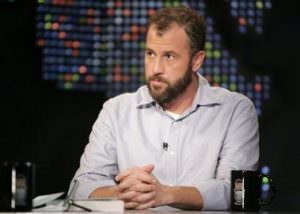The Bestselling Fake True Story
Memoirist-fraud James Frey brings out the big gun on "Larry King Live."On Tuesday, the investigative website The Smoking Gun published the six-page report, “A Million Little Lies,” exposing a number of fictional events in James Frey’s supposedly nonfiction memoir “A Million Little Pieces.” TSG reported that the confessional, an Oprah Book Club selection and a memoir of Frey’s struggle with drug and alcohol abuse and eventual recovery, was riddled with exaggerations, embellishments and outright lies, including claims that he’d beat up a cop and spent three months in jail, as well as an extremely suspect incident involving a fatal car accident.
The scandal was certainly enough to undermine the credibility of the memoir, the man and, worse, Oprah’s taste in books. It also made Frey famous. Not just writer famous, but star famous. JT LeRoy hasn’t quite capitalized on his 15 minutes — perhaps because his is a more narrow audience, perhaps because it’s hard to do television appearances when you don’t exist — but Frey, already flourishing under Oprah’s halo, now managed to do the near impossible: The scandal over his untrue true story bumped both Lindsay Lohan and the Brangelina out of the headlines.
Usually it takes weeks or months for beleaguered celebrities to orchestrate their public coming-out, but these are accelerated times, and James Frey broke his media silence yesterday, choosing a celebrity interviewer known for his unrelenting questioning style, ruthless integrity and dogged determination to get the truth at all costs: Larry King. King grilled the famous fabricator with questions such as “Are you surprised at the furor?” and “What are your feelings about ‘The Smoking Gun’?” and “Are you a bad guy?”
To be fair to King, Frey has been well coached, and he seems to have learned his interview strategies from George Bush: Repeat a few choice phrases over and over again, do not answer any questions directly, evade, and do it all with a charmless affect and slippery evasions of responsibility at every turn. Above all, stay on message.
Which is exactly what Frey did. Frey’s “defense” seemed to involve matching one of three answers to every question posed: “I stand by my book and my life” and “changed facts to protect people’s identities” and “This is a book about drug and alcohol abuse, nobody has once denied that I was an addict.”
His big defense is that since the disputed sections make up only a small percentage of the book’s page count, the matter is being blown out of proportion. This is a blank refusal to face the idea that telling the whole truth is exactly what credibility is all about. In addition to being specious and illogical, the Frey non-conversation with King wasn’t getting anywhere, even after Frey’s mother came on screen to defend her baby. And then, suddenly, the skies parted, thunder rolled and King received a “surprise” phone call from Oprah herself.
Like Bill Clinton, Winfrey is an empath-demon: Her warm timbres, the depths of sincerity in her voice, the feeling that she is just one of us common folk and, of course, her ability to speak well on just about anything gives her a brainwashing charisma. The woman is so accessible and convincing as an Everyman that you even buy her complaint that she had a hard time getting through on the show’s call line!
So of course her rush to defend Frey had an effect that was not just legitimating but sanctifying. She insisted that she stood by the book, by Frey, by the incredible power of his harrowing story, the story of how he became “the man you see before you today.” (A liar, but an inspiring one.) “What I think,” she continued, in that soothing, powerful singsong we all love, “is that this is going to open up the discussion…. The bigger thing is what is this going to say to the world about the memoir category. The bigger question is what does this mean for the larger publishing world?”
Frey is off the hook, the book publishers aren’t. Industry take heed: If Oprah gives up faith in the nonfiction market, it could cripple one of the most profitable arms of the business — the bestselling memoir.
And now Larry King had run seven minutes over time. Never mind that a big part of sobriety is supposed to be telling the truth and being accountable for one’s actions. Never mind that memoirs are supposed to draw their authority in proportion to their connection with reality, never mind that “A Million Little Pieces” sold itself on its own gritty, harrowing, real-life pain … and of course never mind the scandal’s real-world financial implications and back-table negotiating. Time was up, and so Oprah left us with an assurance that the book was still an “Oprah recommends,” and with soothing words for an earlier caller:
You know what? I was really touched by the woman who called, I think it was from Carmel … who said, as an addict, what do I do now? What do I — does this — is this true? … If you’re an addict whose life has been moved by this story and you feel that what James went through was able to — to help you hold on a little bit longer, and you connected to that, that is real.
And here Oprah’s voice deepened an octave, and the Significant Capital Letters crept into rhythm, as she repeated “That … Is … Real.”
So sleep well, Frey fans, because subjectivity trumps all. Another great battle won in the American war on reason. If you feel it, it must be true.
Your support is crucial…With an uncertain future and a new administration casting doubt on press freedoms, the danger is clear: The truth is at risk.
Now is the time to give. Your tax-deductible support allows us to dig deeper, delivering fearless investigative reporting and analysis that exposes what’s really happening — without compromise.
Stand with our courageous journalists. Donate today to protect a free press, uphold democracy and unearth untold stories.




You need to be a supporter to comment.
There are currently no responses to this article.
Be the first to respond.